HI6027 Business and Corporate Law: Case Study Group Assignment
VerifiedAdded on 2022/11/16
|9
|2170
|484
Homework Assignment
AI Summary
This assignment is a group written report analyzing two case studies in business and corporate law, specifically for the HI6027 Business and Corporate Law unit at Holmes Institute. The first case examines the doctrine of frustration in contract law, where a metal fabrication business owner, Gary, faces a contract breach due to government land acquisition. The analysis applies legal principles from cases like Croockewit v Fletcher to determine Gary's liability. The second case explores company law, focusing on pre-incorporation contracts and the liability of individuals (Adam and Poh) who entered a contract on behalf of a company (Master Plate Pty Ltd) before its registration. The analysis considers sections of the Corporations Act 2001, including sections 127, 128, 129 and 131, and the assumptions that can be made by an outsider (Carvers Pty Ltd). The report concludes on the entitlements of Carvers Pty Ltd and the liabilities of Adam and Poh. The assignment aims to assess students' understanding of contract, company and corporation law, obligations, rights and remedies available to parties in commercial relationships, and the application of relevant legal principles to factual scenarios.
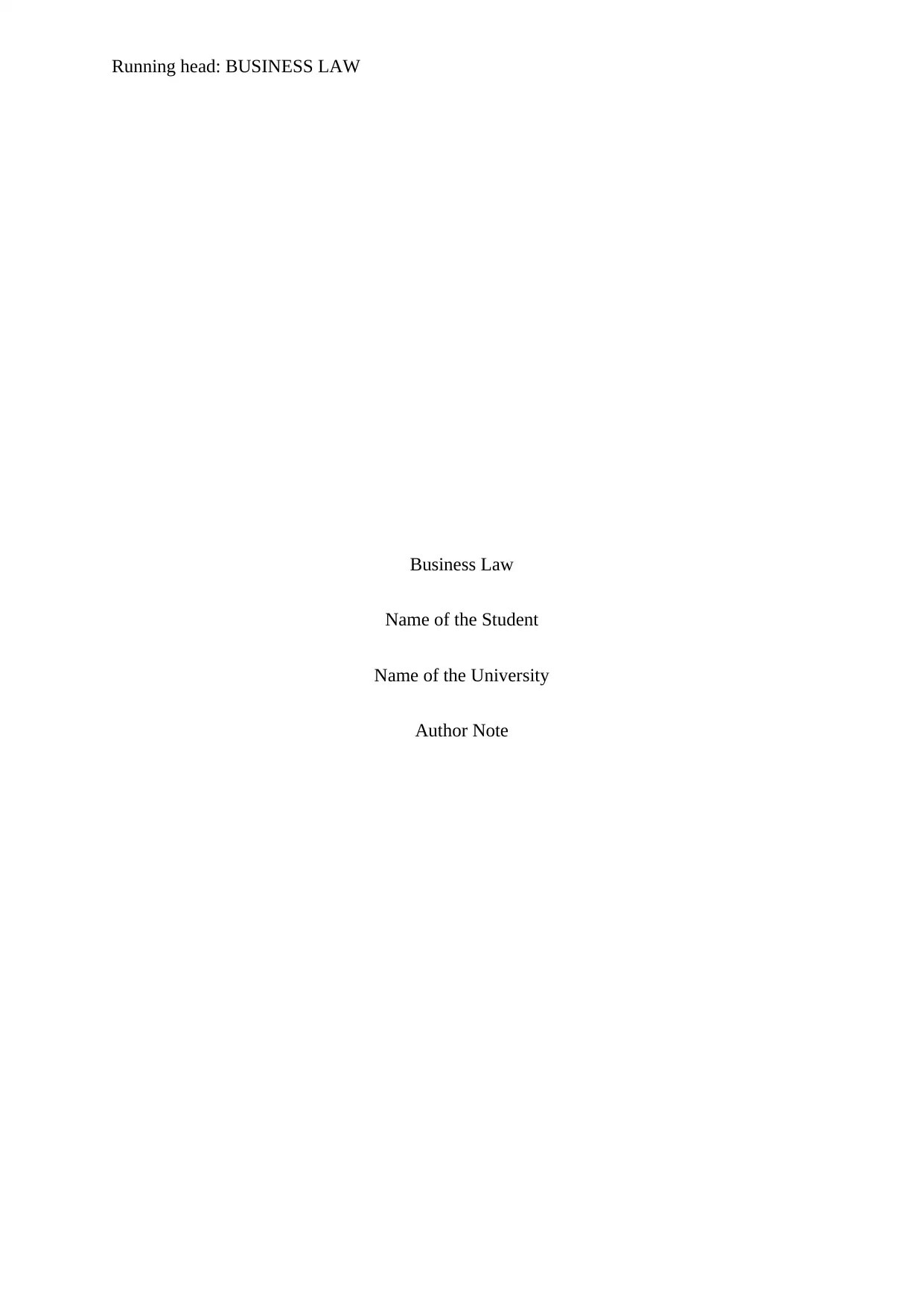
Running head: BUSINESS LAW
Business Law
Name of the Student
Name of the University
Author Note
Business Law
Name of the Student
Name of the University
Author Note
Paraphrase This Document
Need a fresh take? Get an instant paraphrase of this document with our AI Paraphraser
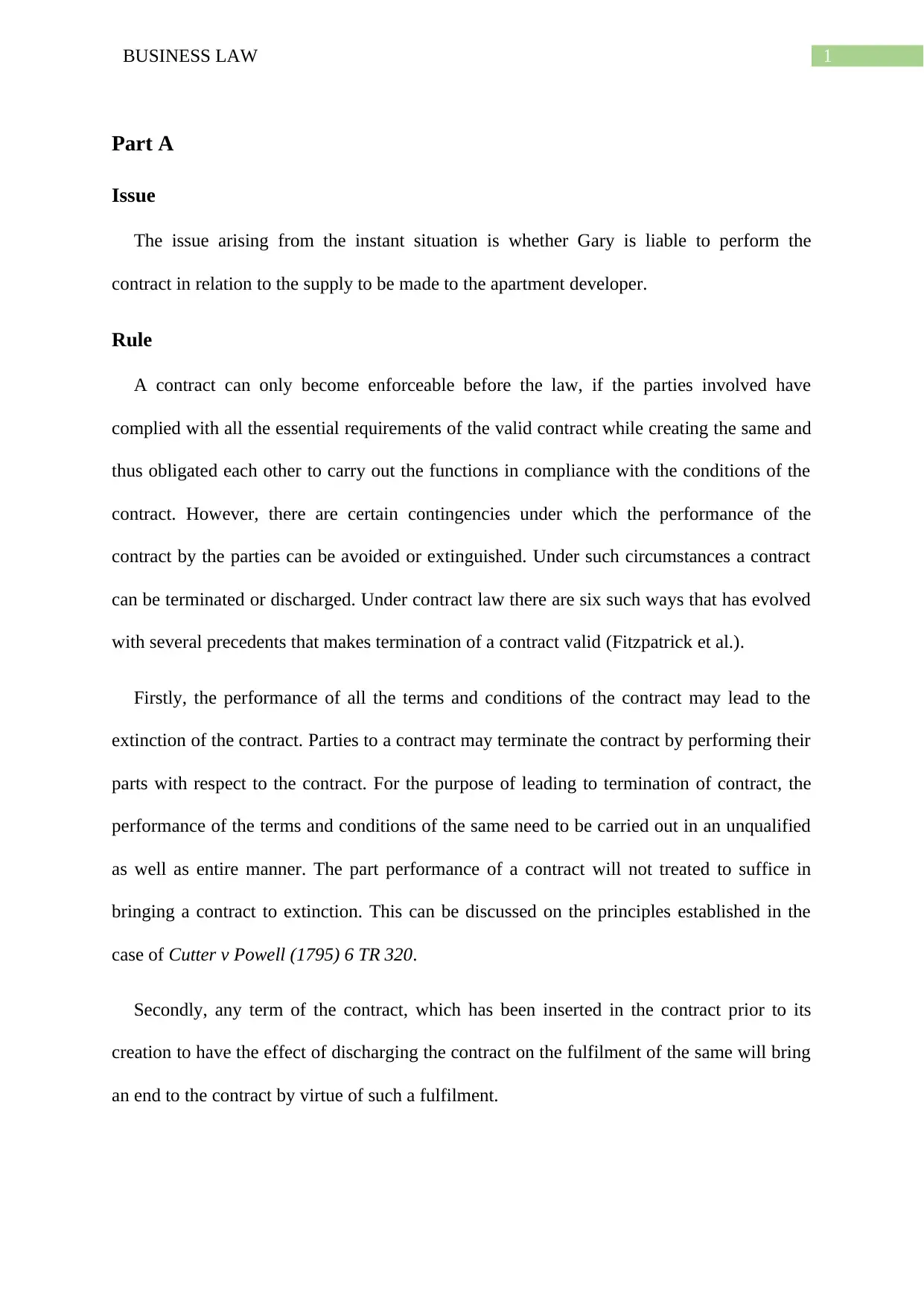
1BUSINESS LAW
Part A
Issue
The issue arising from the instant situation is whether Gary is liable to perform the
contract in relation to the supply to be made to the apartment developer.
Rule
A contract can only become enforceable before the law, if the parties involved have
complied with all the essential requirements of the valid contract while creating the same and
thus obligated each other to carry out the functions in compliance with the conditions of the
contract. However, there are certain contingencies under which the performance of the
contract by the parties can be avoided or extinguished. Under such circumstances a contract
can be terminated or discharged. Under contract law there are six such ways that has evolved
with several precedents that makes termination of a contract valid (Fitzpatrick et al.).
Firstly, the performance of all the terms and conditions of the contract may lead to the
extinction of the contract. Parties to a contract may terminate the contract by performing their
parts with respect to the contract. For the purpose of leading to termination of contract, the
performance of the terms and conditions of the same need to be carried out in an unqualified
as well as entire manner. The part performance of a contract will not treated to suffice in
bringing a contract to extinction. This can be discussed on the principles established in the
case of Cutter v Powell (1795) 6 TR 320.
Secondly, any term of the contract, which has been inserted in the contract prior to its
creation to have the effect of discharging the contract on the fulfilment of the same will bring
an end to the contract by virtue of such a fulfilment.
Part A
Issue
The issue arising from the instant situation is whether Gary is liable to perform the
contract in relation to the supply to be made to the apartment developer.
Rule
A contract can only become enforceable before the law, if the parties involved have
complied with all the essential requirements of the valid contract while creating the same and
thus obligated each other to carry out the functions in compliance with the conditions of the
contract. However, there are certain contingencies under which the performance of the
contract by the parties can be avoided or extinguished. Under such circumstances a contract
can be terminated or discharged. Under contract law there are six such ways that has evolved
with several precedents that makes termination of a contract valid (Fitzpatrick et al.).
Firstly, the performance of all the terms and conditions of the contract may lead to the
extinction of the contract. Parties to a contract may terminate the contract by performing their
parts with respect to the contract. For the purpose of leading to termination of contract, the
performance of the terms and conditions of the same need to be carried out in an unqualified
as well as entire manner. The part performance of a contract will not treated to suffice in
bringing a contract to extinction. This can be discussed on the principles established in the
case of Cutter v Powell (1795) 6 TR 320.
Secondly, any term of the contract, which has been inserted in the contract prior to its
creation to have the effect of discharging the contract on the fulfilment of the same will bring
an end to the contract by virtue of such a fulfilment.
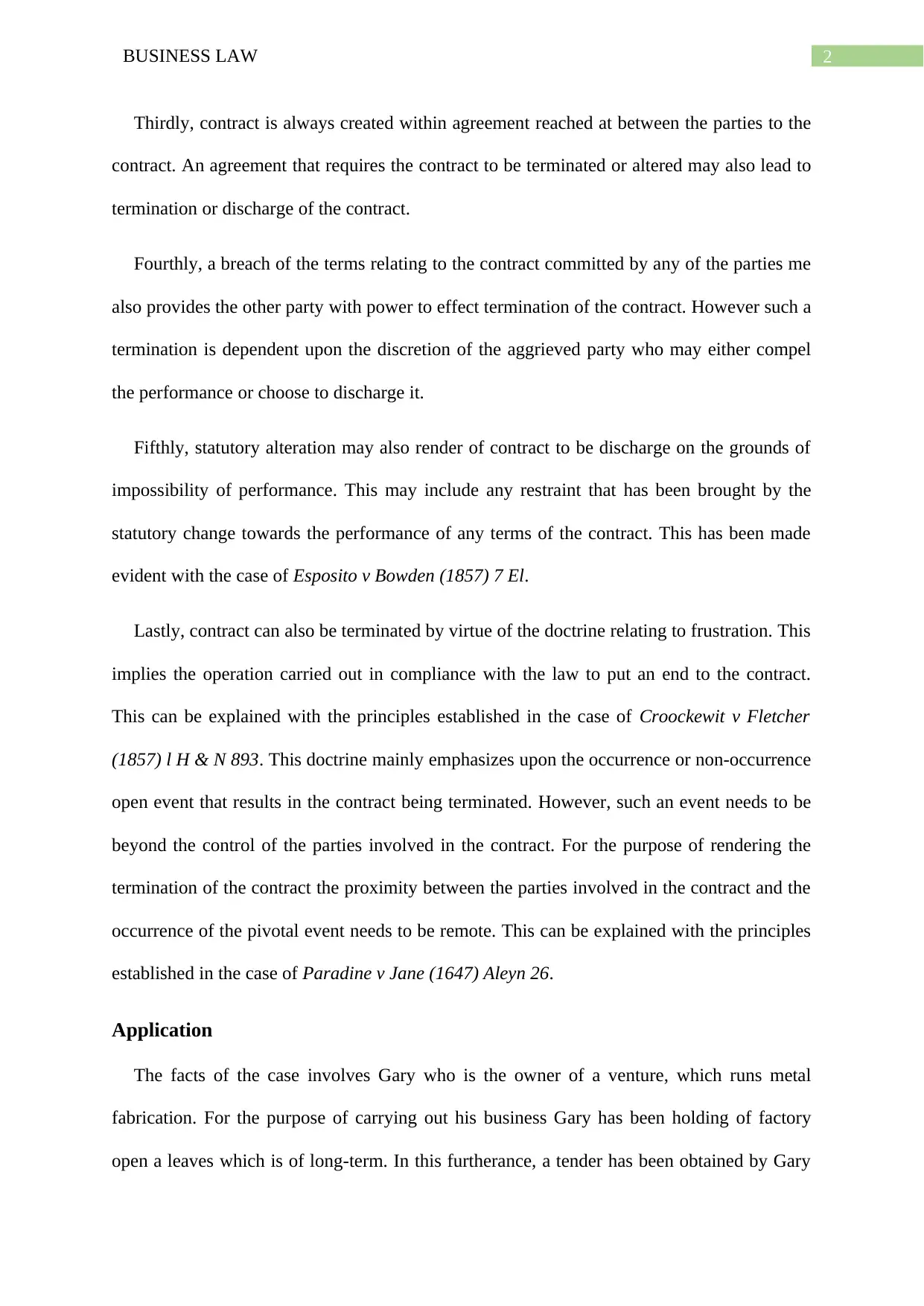
2BUSINESS LAW
Thirdly, contract is always created within agreement reached at between the parties to the
contract. An agreement that requires the contract to be terminated or altered may also lead to
termination or discharge of the contract.
Fourthly, a breach of the terms relating to the contract committed by any of the parties me
also provides the other party with power to effect termination of the contract. However such a
termination is dependent upon the discretion of the aggrieved party who may either compel
the performance or choose to discharge it.
Fifthly, statutory alteration may also render of contract to be discharge on the grounds of
impossibility of performance. This may include any restraint that has been brought by the
statutory change towards the performance of any terms of the contract. This has been made
evident with the case of Esposito v Bowden (1857) 7 El.
Lastly, contract can also be terminated by virtue of the doctrine relating to frustration. This
implies the operation carried out in compliance with the law to put an end to the contract.
This can be explained with the principles established in the case of Croockewit v Fletcher
(1857) l H & N 893. This doctrine mainly emphasizes upon the occurrence or non-occurrence
open event that results in the contract being terminated. However, such an event needs to be
beyond the control of the parties involved in the contract. For the purpose of rendering the
termination of the contract the proximity between the parties involved in the contract and the
occurrence of the pivotal event needs to be remote. This can be explained with the principles
established in the case of Paradine v Jane (1647) Aleyn 26.
Application
The facts of the case involves Gary who is the owner of a venture, which runs metal
fabrication. For the purpose of carrying out his business Gary has been holding of factory
open a leaves which is of long-term. In this furtherance, a tender has been obtained by Gary
Thirdly, contract is always created within agreement reached at between the parties to the
contract. An agreement that requires the contract to be terminated or altered may also lead to
termination or discharge of the contract.
Fourthly, a breach of the terms relating to the contract committed by any of the parties me
also provides the other party with power to effect termination of the contract. However such a
termination is dependent upon the discretion of the aggrieved party who may either compel
the performance or choose to discharge it.
Fifthly, statutory alteration may also render of contract to be discharge on the grounds of
impossibility of performance. This may include any restraint that has been brought by the
statutory change towards the performance of any terms of the contract. This has been made
evident with the case of Esposito v Bowden (1857) 7 El.
Lastly, contract can also be terminated by virtue of the doctrine relating to frustration. This
implies the operation carried out in compliance with the law to put an end to the contract.
This can be explained with the principles established in the case of Croockewit v Fletcher
(1857) l H & N 893. This doctrine mainly emphasizes upon the occurrence or non-occurrence
open event that results in the contract being terminated. However, such an event needs to be
beyond the control of the parties involved in the contract. For the purpose of rendering the
termination of the contract the proximity between the parties involved in the contract and the
occurrence of the pivotal event needs to be remote. This can be explained with the principles
established in the case of Paradine v Jane (1647) Aleyn 26.
Application
The facts of the case involves Gary who is the owner of a venture, which runs metal
fabrication. For the purpose of carrying out his business Gary has been holding of factory
open a leaves which is of long-term. In this furtherance, a tender has been obtained by Gary
⊘ This is a preview!⊘
Do you want full access?
Subscribe today to unlock all pages.

Trusted by 1+ million students worldwide
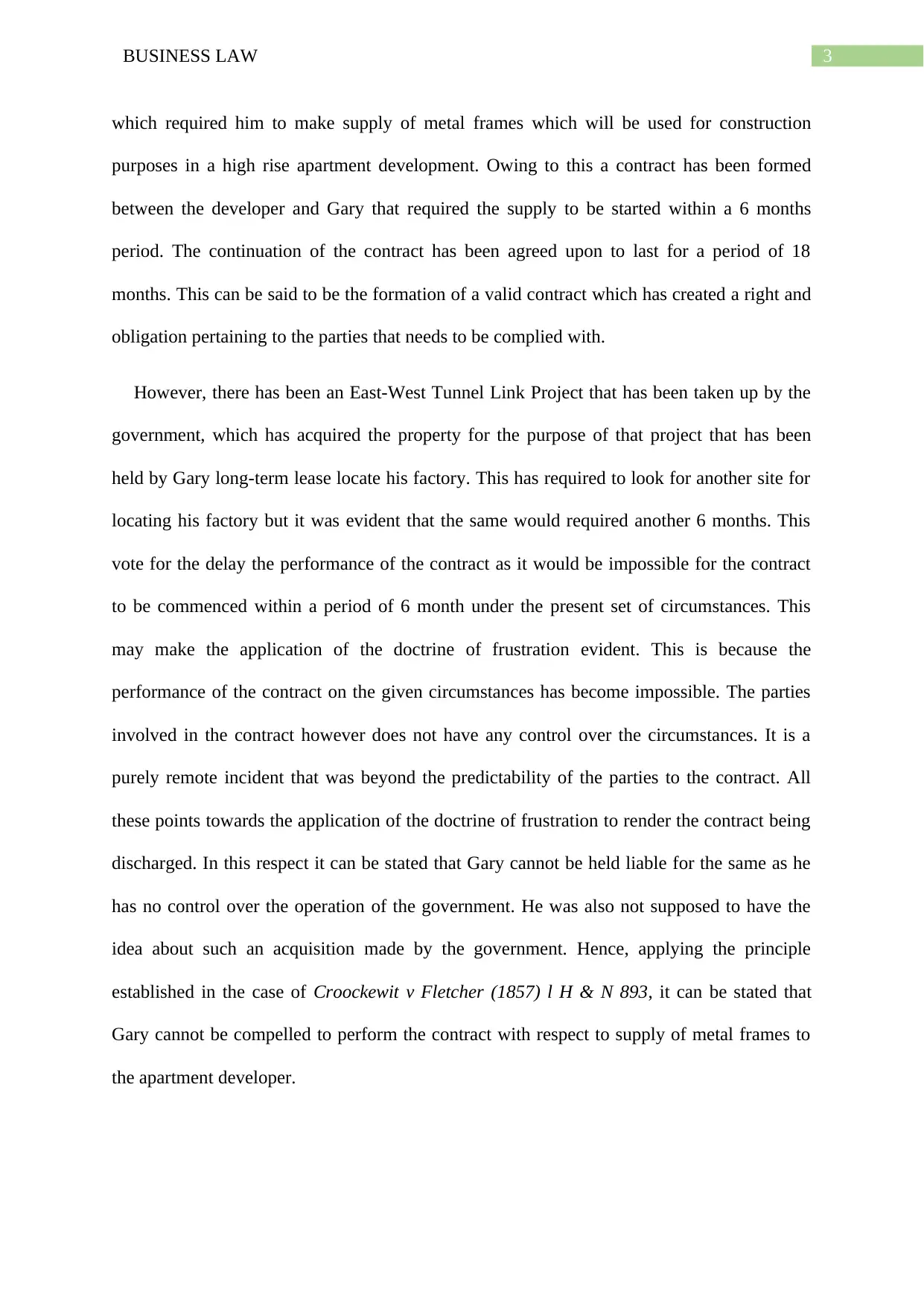
3BUSINESS LAW
which required him to make supply of metal frames which will be used for construction
purposes in a high rise apartment development. Owing to this a contract has been formed
between the developer and Gary that required the supply to be started within a 6 months
period. The continuation of the contract has been agreed upon to last for a period of 18
months. This can be said to be the formation of a valid contract which has created a right and
obligation pertaining to the parties that needs to be complied with.
However, there has been an East-West Tunnel Link Project that has been taken up by the
government, which has acquired the property for the purpose of that project that has been
held by Gary long-term lease locate his factory. This has required to look for another site for
locating his factory but it was evident that the same would required another 6 months. This
vote for the delay the performance of the contract as it would be impossible for the contract
to be commenced within a period of 6 month under the present set of circumstances. This
may make the application of the doctrine of frustration evident. This is because the
performance of the contract on the given circumstances has become impossible. The parties
involved in the contract however does not have any control over the circumstances. It is a
purely remote incident that was beyond the predictability of the parties to the contract. All
these points towards the application of the doctrine of frustration to render the contract being
discharged. In this respect it can be stated that Gary cannot be held liable for the same as he
has no control over the operation of the government. He was also not supposed to have the
idea about such an acquisition made by the government. Hence, applying the principle
established in the case of Croockewit v Fletcher (1857) l H & N 893, it can be stated that
Gary cannot be compelled to perform the contract with respect to supply of metal frames to
the apartment developer.
which required him to make supply of metal frames which will be used for construction
purposes in a high rise apartment development. Owing to this a contract has been formed
between the developer and Gary that required the supply to be started within a 6 months
period. The continuation of the contract has been agreed upon to last for a period of 18
months. This can be said to be the formation of a valid contract which has created a right and
obligation pertaining to the parties that needs to be complied with.
However, there has been an East-West Tunnel Link Project that has been taken up by the
government, which has acquired the property for the purpose of that project that has been
held by Gary long-term lease locate his factory. This has required to look for another site for
locating his factory but it was evident that the same would required another 6 months. This
vote for the delay the performance of the contract as it would be impossible for the contract
to be commenced within a period of 6 month under the present set of circumstances. This
may make the application of the doctrine of frustration evident. This is because the
performance of the contract on the given circumstances has become impossible. The parties
involved in the contract however does not have any control over the circumstances. It is a
purely remote incident that was beyond the predictability of the parties to the contract. All
these points towards the application of the doctrine of frustration to render the contract being
discharged. In this respect it can be stated that Gary cannot be held liable for the same as he
has no control over the operation of the government. He was also not supposed to have the
idea about such an acquisition made by the government. Hence, applying the principle
established in the case of Croockewit v Fletcher (1857) l H & N 893, it can be stated that
Gary cannot be compelled to perform the contract with respect to supply of metal frames to
the apartment developer.
Paraphrase This Document
Need a fresh take? Get an instant paraphrase of this document with our AI Paraphraser
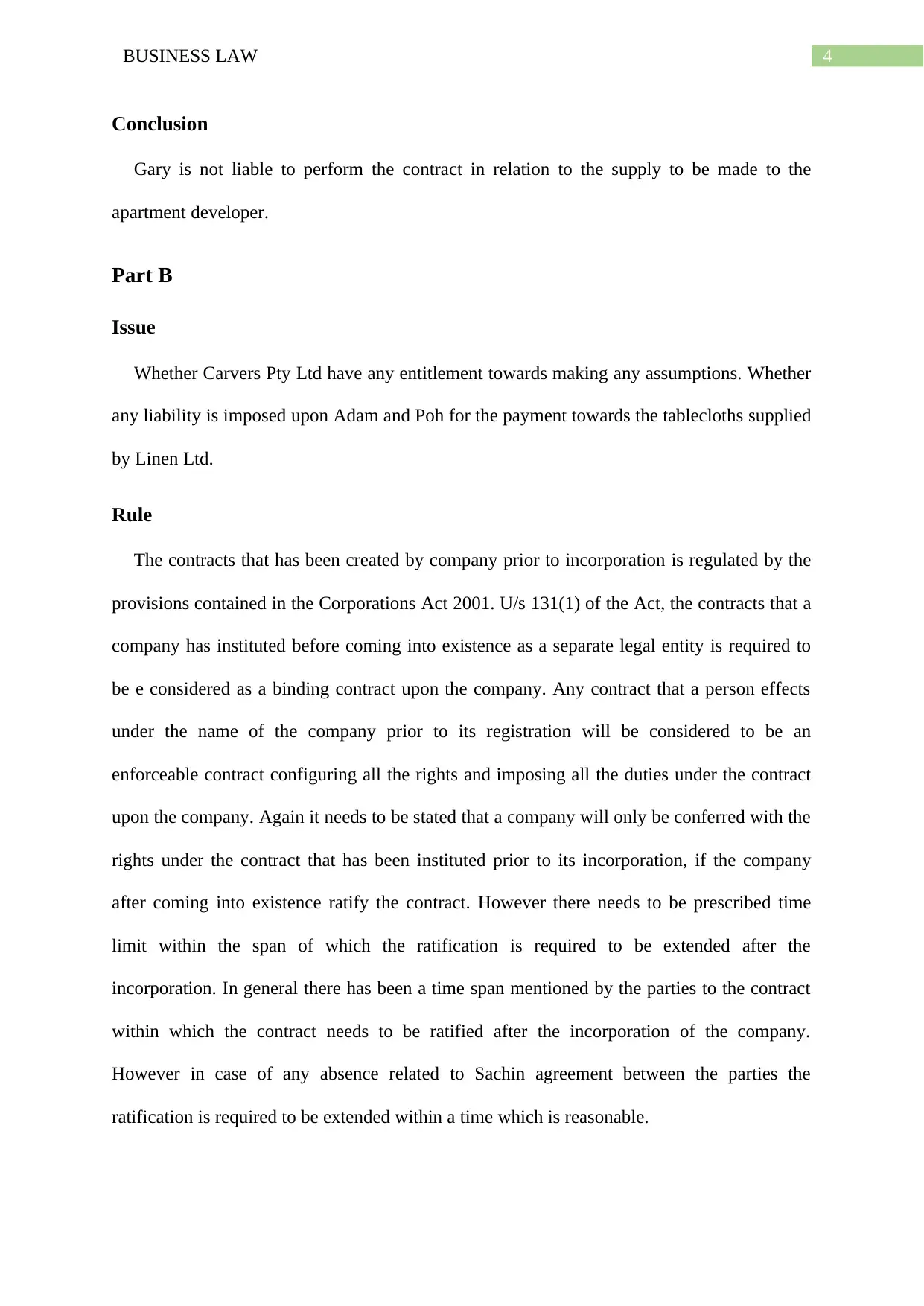
4BUSINESS LAW
Conclusion
Gary is not liable to perform the contract in relation to the supply to be made to the
apartment developer.
Part B
Issue
Whether Carvers Pty Ltd have any entitlement towards making any assumptions. Whether
any liability is imposed upon Adam and Poh for the payment towards the tablecloths supplied
by Linen Ltd.
Rule
The contracts that has been created by company prior to incorporation is regulated by the
provisions contained in the Corporations Act 2001. U/s 131(1) of the Act, the contracts that a
company has instituted before coming into existence as a separate legal entity is required to
be e considered as a binding contract upon the company. Any contract that a person effects
under the name of the company prior to its registration will be considered to be an
enforceable contract configuring all the rights and imposing all the duties under the contract
upon the company. Again it needs to be stated that a company will only be conferred with the
rights under the contract that has been instituted prior to its incorporation, if the company
after coming into existence ratify the contract. However there needs to be prescribed time
limit within the span of which the ratification is required to be extended after the
incorporation. In general there has been a time span mentioned by the parties to the contract
within which the contract needs to be ratified after the incorporation of the company.
However in case of any absence related to Sachin agreement between the parties the
ratification is required to be extended within a time which is reasonable.
Conclusion
Gary is not liable to perform the contract in relation to the supply to be made to the
apartment developer.
Part B
Issue
Whether Carvers Pty Ltd have any entitlement towards making any assumptions. Whether
any liability is imposed upon Adam and Poh for the payment towards the tablecloths supplied
by Linen Ltd.
Rule
The contracts that has been created by company prior to incorporation is regulated by the
provisions contained in the Corporations Act 2001. U/s 131(1) of the Act, the contracts that a
company has instituted before coming into existence as a separate legal entity is required to
be e considered as a binding contract upon the company. Any contract that a person effects
under the name of the company prior to its registration will be considered to be an
enforceable contract configuring all the rights and imposing all the duties under the contract
upon the company. Again it needs to be stated that a company will only be conferred with the
rights under the contract that has been instituted prior to its incorporation, if the company
after coming into existence ratify the contract. However there needs to be prescribed time
limit within the span of which the ratification is required to be extended after the
incorporation. In general there has been a time span mentioned by the parties to the contract
within which the contract needs to be ratified after the incorporation of the company.
However in case of any absence related to Sachin agreement between the parties the
ratification is required to be extended within a time which is reasonable.
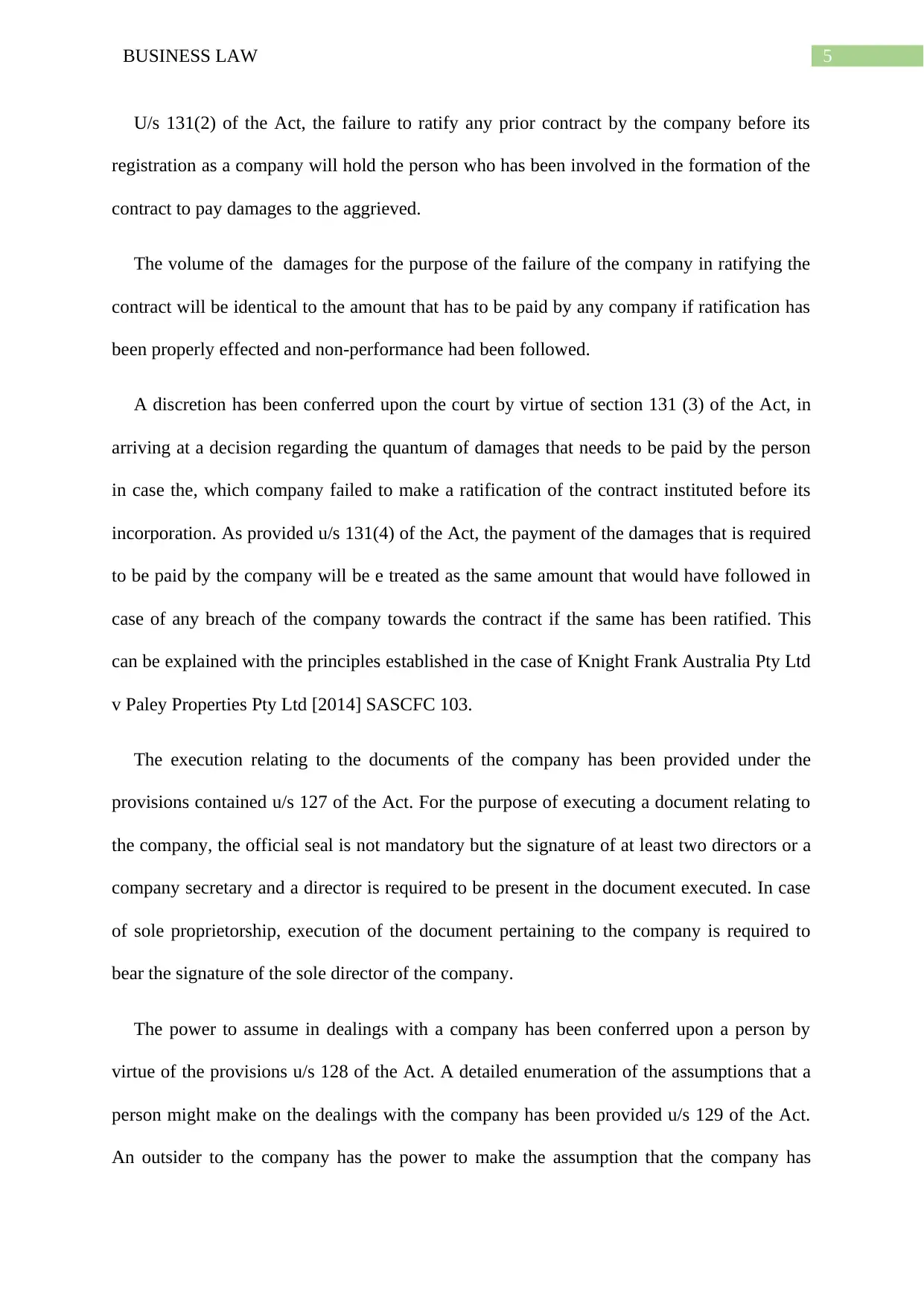
5BUSINESS LAW
U/s 131(2) of the Act, the failure to ratify any prior contract by the company before its
registration as a company will hold the person who has been involved in the formation of the
contract to pay damages to the aggrieved.
The volume of the damages for the purpose of the failure of the company in ratifying the
contract will be identical to the amount that has to be paid by any company if ratification has
been properly effected and non-performance had been followed.
A discretion has been conferred upon the court by virtue of section 131 (3) of the Act, in
arriving at a decision regarding the quantum of damages that needs to be paid by the person
in case the, which company failed to make a ratification of the contract instituted before its
incorporation. As provided u/s 131(4) of the Act, the payment of the damages that is required
to be paid by the company will be e treated as the same amount that would have followed in
case of any breach of the company towards the contract if the same has been ratified. This
can be explained with the principles established in the case of Knight Frank Australia Pty Ltd
v Paley Properties Pty Ltd [2014] SASCFC 103.
The execution relating to the documents of the company has been provided under the
provisions contained u/s 127 of the Act. For the purpose of executing a document relating to
the company, the official seal is not mandatory but the signature of at least two directors or a
company secretary and a director is required to be present in the document executed. In case
of sole proprietorship, execution of the document pertaining to the company is required to
bear the signature of the sole director of the company.
The power to assume in dealings with a company has been conferred upon a person by
virtue of the provisions u/s 128 of the Act. A detailed enumeration of the assumptions that a
person might make on the dealings with the company has been provided u/s 129 of the Act.
An outsider to the company has the power to make the assumption that the company has
U/s 131(2) of the Act, the failure to ratify any prior contract by the company before its
registration as a company will hold the person who has been involved in the formation of the
contract to pay damages to the aggrieved.
The volume of the damages for the purpose of the failure of the company in ratifying the
contract will be identical to the amount that has to be paid by any company if ratification has
been properly effected and non-performance had been followed.
A discretion has been conferred upon the court by virtue of section 131 (3) of the Act, in
arriving at a decision regarding the quantum of damages that needs to be paid by the person
in case the, which company failed to make a ratification of the contract instituted before its
incorporation. As provided u/s 131(4) of the Act, the payment of the damages that is required
to be paid by the company will be e treated as the same amount that would have followed in
case of any breach of the company towards the contract if the same has been ratified. This
can be explained with the principles established in the case of Knight Frank Australia Pty Ltd
v Paley Properties Pty Ltd [2014] SASCFC 103.
The execution relating to the documents of the company has been provided under the
provisions contained u/s 127 of the Act. For the purpose of executing a document relating to
the company, the official seal is not mandatory but the signature of at least two directors or a
company secretary and a director is required to be present in the document executed. In case
of sole proprietorship, execution of the document pertaining to the company is required to
bear the signature of the sole director of the company.
The power to assume in dealings with a company has been conferred upon a person by
virtue of the provisions u/s 128 of the Act. A detailed enumeration of the assumptions that a
person might make on the dealings with the company has been provided u/s 129 of the Act.
An outsider to the company has the power to make the assumption that the company has
⊘ This is a preview!⊘
Do you want full access?
Subscribe today to unlock all pages.

Trusted by 1+ million students worldwide
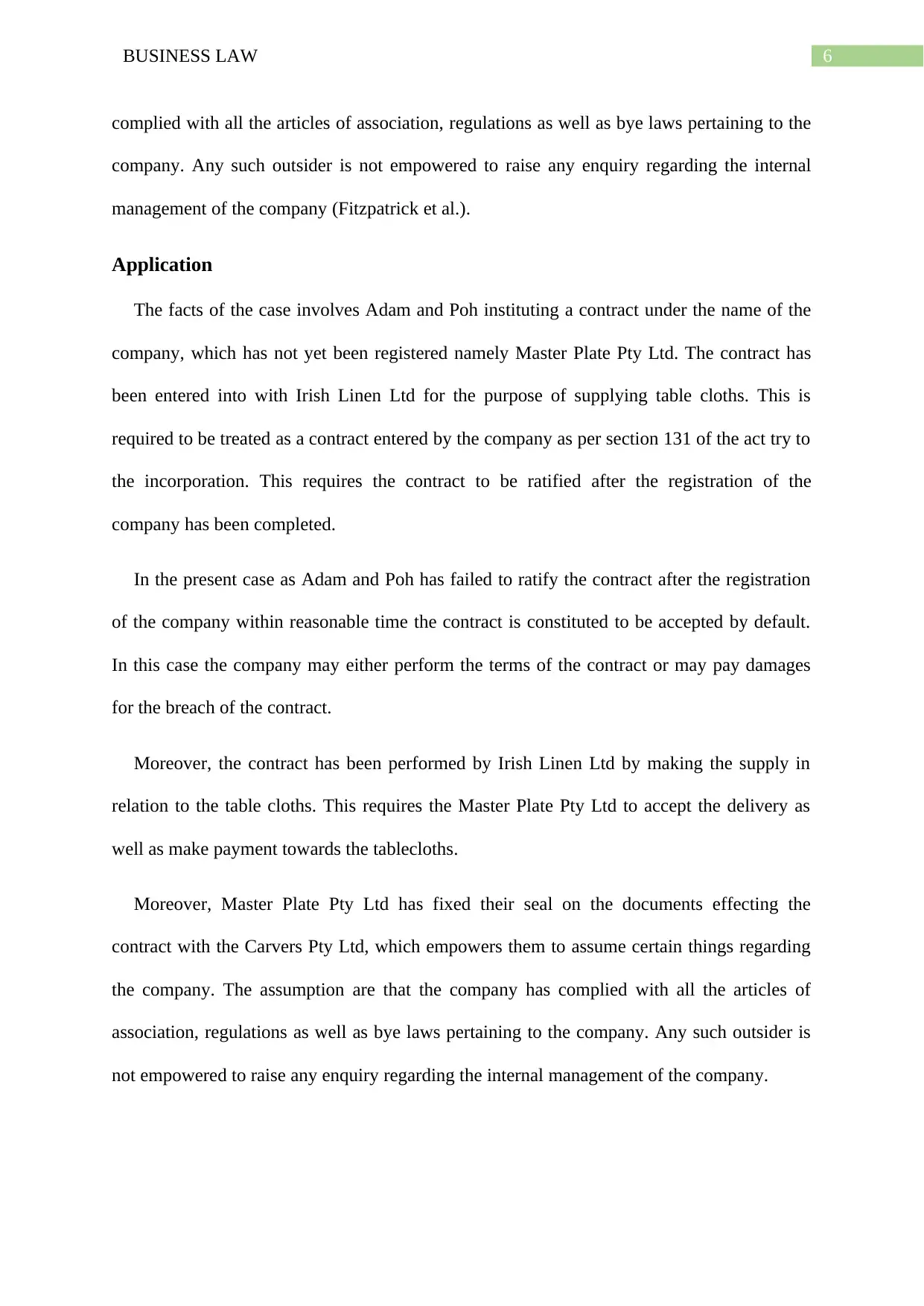
6BUSINESS LAW
complied with all the articles of association, regulations as well as bye laws pertaining to the
company. Any such outsider is not empowered to raise any enquiry regarding the internal
management of the company (Fitzpatrick et al.).
Application
The facts of the case involves Adam and Poh instituting a contract under the name of the
company, which has not yet been registered namely Master Plate Pty Ltd. The contract has
been entered into with Irish Linen Ltd for the purpose of supplying table cloths. This is
required to be treated as a contract entered by the company as per section 131 of the act try to
the incorporation. This requires the contract to be ratified after the registration of the
company has been completed.
In the present case as Adam and Poh has failed to ratify the contract after the registration
of the company within reasonable time the contract is constituted to be accepted by default.
In this case the company may either perform the terms of the contract or may pay damages
for the breach of the contract.
Moreover, the contract has been performed by Irish Linen Ltd by making the supply in
relation to the table cloths. This requires the Master Plate Pty Ltd to accept the delivery as
well as make payment towards the tablecloths.
Moreover, Master Plate Pty Ltd has fixed their seal on the documents effecting the
contract with the Carvers Pty Ltd, which empowers them to assume certain things regarding
the company. The assumption are that the company has complied with all the articles of
association, regulations as well as bye laws pertaining to the company. Any such outsider is
not empowered to raise any enquiry regarding the internal management of the company.
complied with all the articles of association, regulations as well as bye laws pertaining to the
company. Any such outsider is not empowered to raise any enquiry regarding the internal
management of the company (Fitzpatrick et al.).
Application
The facts of the case involves Adam and Poh instituting a contract under the name of the
company, which has not yet been registered namely Master Plate Pty Ltd. The contract has
been entered into with Irish Linen Ltd for the purpose of supplying table cloths. This is
required to be treated as a contract entered by the company as per section 131 of the act try to
the incorporation. This requires the contract to be ratified after the registration of the
company has been completed.
In the present case as Adam and Poh has failed to ratify the contract after the registration
of the company within reasonable time the contract is constituted to be accepted by default.
In this case the company may either perform the terms of the contract or may pay damages
for the breach of the contract.
Moreover, the contract has been performed by Irish Linen Ltd by making the supply in
relation to the table cloths. This requires the Master Plate Pty Ltd to accept the delivery as
well as make payment towards the tablecloths.
Moreover, Master Plate Pty Ltd has fixed their seal on the documents effecting the
contract with the Carvers Pty Ltd, which empowers them to assume certain things regarding
the company. The assumption are that the company has complied with all the articles of
association, regulations as well as bye laws pertaining to the company. Any such outsider is
not empowered to raise any enquiry regarding the internal management of the company.
Paraphrase This Document
Need a fresh take? Get an instant paraphrase of this document with our AI Paraphraser
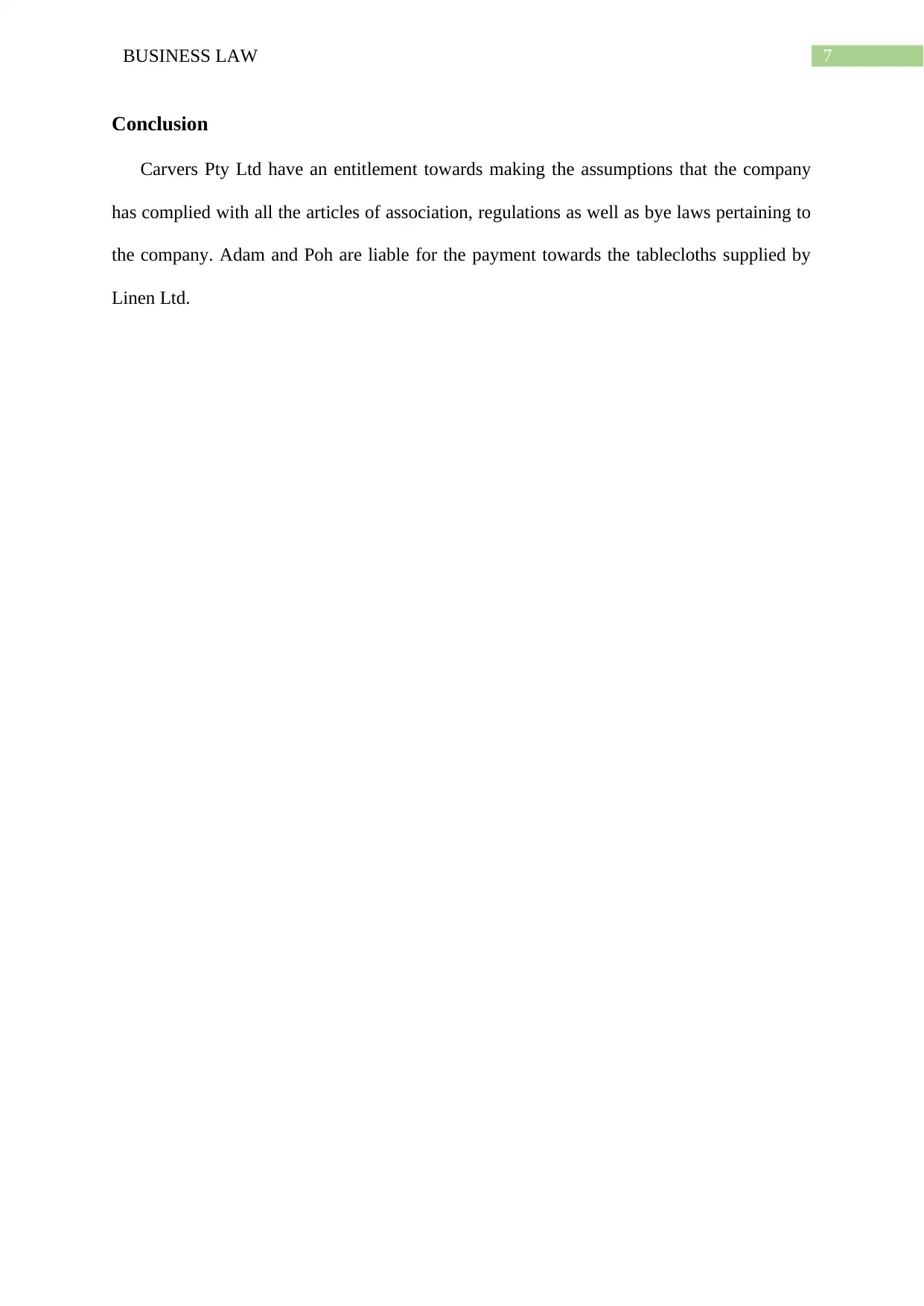
7BUSINESS LAW
Conclusion
Carvers Pty Ltd have an entitlement towards making the assumptions that the company
has complied with all the articles of association, regulations as well as bye laws pertaining to
the company. Adam and Poh are liable for the payment towards the tablecloths supplied by
Linen Ltd.
Conclusion
Carvers Pty Ltd have an entitlement towards making the assumptions that the company
has complied with all the articles of association, regulations as well as bye laws pertaining to
the company. Adam and Poh are liable for the payment towards the tablecloths supplied by
Linen Ltd.
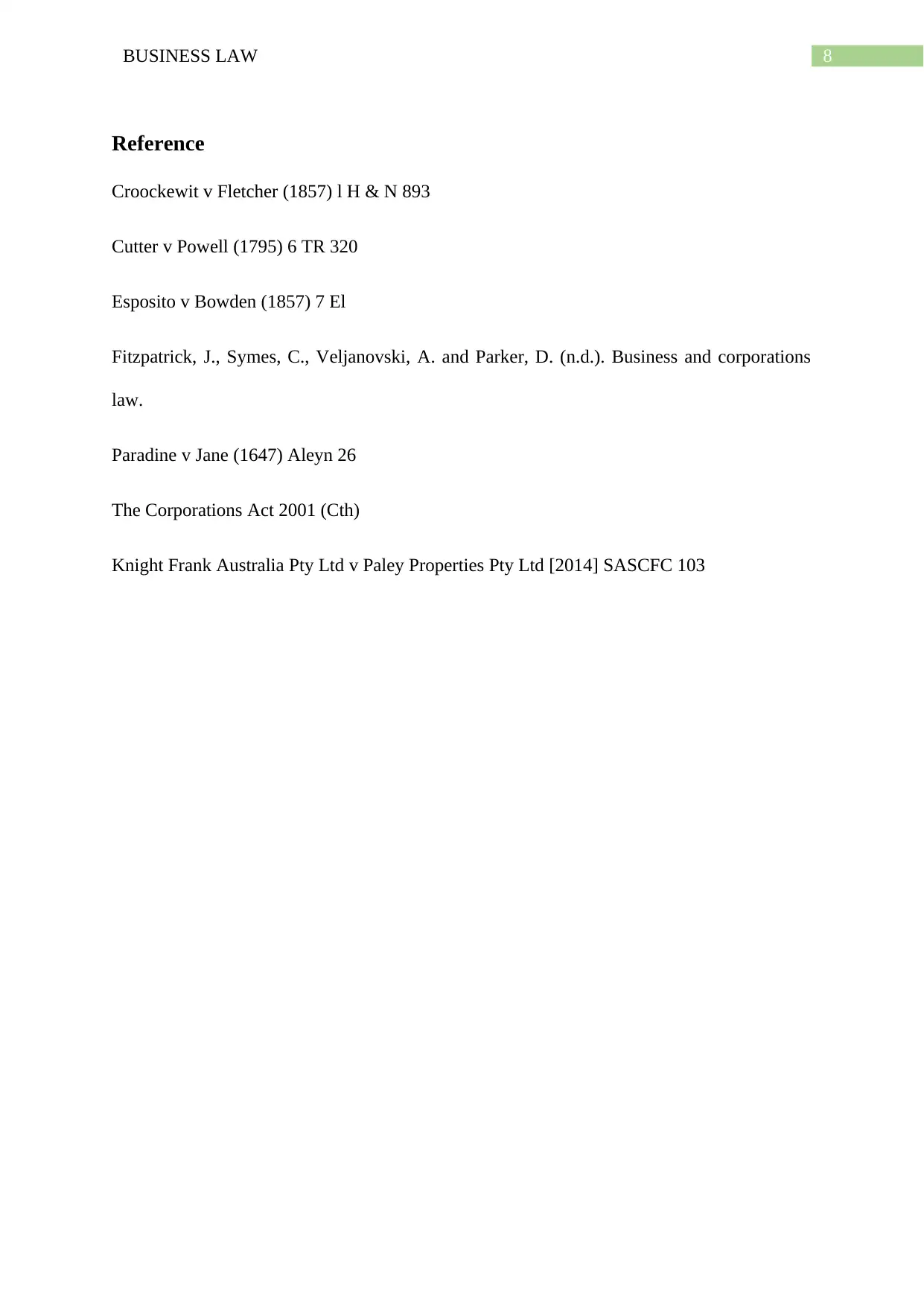
8BUSINESS LAW
Reference
Croockewit v Fletcher (1857) l H & N 893
Cutter v Powell (1795) 6 TR 320
Esposito v Bowden (1857) 7 El
Fitzpatrick, J., Symes, C., Veljanovski, A. and Parker, D. (n.d.). Business and corporations
law.
Paradine v Jane (1647) Aleyn 26
The Corporations Act 2001 (Cth)
Knight Frank Australia Pty Ltd v Paley Properties Pty Ltd [2014] SASCFC 103
Reference
Croockewit v Fletcher (1857) l H & N 893
Cutter v Powell (1795) 6 TR 320
Esposito v Bowden (1857) 7 El
Fitzpatrick, J., Symes, C., Veljanovski, A. and Parker, D. (n.d.). Business and corporations
law.
Paradine v Jane (1647) Aleyn 26
The Corporations Act 2001 (Cth)
Knight Frank Australia Pty Ltd v Paley Properties Pty Ltd [2014] SASCFC 103
⊘ This is a preview!⊘
Do you want full access?
Subscribe today to unlock all pages.

Trusted by 1+ million students worldwide
1 out of 9
Related Documents
Your All-in-One AI-Powered Toolkit for Academic Success.
+13062052269
info@desklib.com
Available 24*7 on WhatsApp / Email
![[object Object]](/_next/static/media/star-bottom.7253800d.svg)
Unlock your academic potential
Copyright © 2020–2026 A2Z Services. All Rights Reserved. Developed and managed by ZUCOL.





